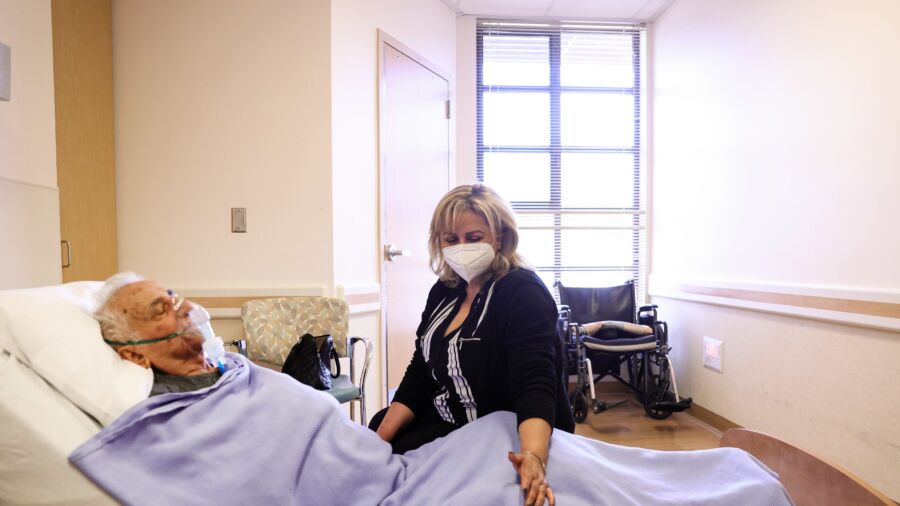The Biden administration has recommended new staffing standard rules that would require many nursing homes to boost the number of nurses—a proposal coming at a time when the sector is said to be facing a “workforce crisis.”
The staffing rules, proposed by the Centers for Medicare & Medicaid Services (CMS), seek to ensure that nursing home owners cannot “slash staffing to unsafe levels,” according to a White House Fact Sheet. “If finalized, the proposal would require every facility to have a Registered Nurse on site 24/7, to have a certain minimum number of registered nurses and nurse aides to help provide routine care, and to staff according to resident needs based on a robust assessment of the facility’s residents.”
CMS is a federal agency within the U.S. Department of Health and Human Services (HHS).
According to the proposed rules, nursing facilities should have a Registered Nurse on site 24/7. To meet this requirement, 22 percent of existing nursing homes would have to hire Registered Nurses, the Fact Sheet stated.
Nursing homes must ensure that resident patients have access to at least 0.55 hours or 33 minutes of care from a Registered Nurse on a daily basis.
This would mean that a facility of 100 residents would need to provide 55 Registered Nurse hours of care over the course of a day. The Fact Sheet estimates that 36 percent of nursing homes will have to hire new Registered Nurses to meet the recommended standards.
In addition, nursing homes must also ensure that residents have access to 2.45 hours or 2 hours and 27 minutes of daily care from a nurse aide. This requirement would force 68 percent of nursing homes to hire new nurse aides who are tasked with helping residents with basic activities like bathing, eating, and going to the bathroom.
The Biden administration’s staffing level proposal has come under criticism.
“To say that we are disappointed that President Biden chose to move forward with the proposed staffing ratios despite clear evidence against them is an understatement,” said Katie Smith Sloan, president and CEO of LeadingAge, the association of nonprofit providers of aging services, including nursing homes.
“It’s meaningless to mandate staffing levels that cannot be met. There are simply no people to hire—especially nurses. The proposed rule requires that nursing homes hire additional staff. But where are they coming from?”
Ms. Sloan insisted that America’s long-term care sector is “in a workforce crisis.” She warned that if the proposed rules are to be finalized, nursing homes will be forced to reduce admissions or even shut down.
LeadingAge represents more than 5,000 nonprofit aging services providers and other mission-minded organizations.
Staffing Woes
A June 2022 survey (pdf) of 759 nursing home providers by the American Health Care Association (AHCA) found that 87 percent of them faced “moderate or high staffing shortages.”
In addition, 98 percent of these facilities were found to have experienced difficulty in hiring staff. Seventy-three percent were concerned about having to shut down due to staffing difficulties.
Almost all nursing homes were found to have requested staff to work more, with 61 percent limiting new admissions. Lack of interest or qualified candidates was found to be the top obstacle in hiring new staff.
Six out of ten nursing home providers were operating at a loss.
According to an estimate (pdf) by the HHS, the total cost of the proposed staffing requirements would come to $40.6 billion over ten years. Healthcare facilities are “expected to bear the burden of these costs.”
Mary Kay Henry, president of the Service Employees International Union (SEIU), welcomed the new staffing standard proposal.
“With this proposal, the Biden Administration sends a powerful message: All nursing homes must be held accountable to minimum staffing standards that will keep residents and workers safe, and ensure that public funding is spent in ways that allow caregivers to deliver the best care possible.”
Staffing Ratios, Promoting ‘High-Quality Care’
Most states already have laws regarding staff-to-patient ratios for nursing homes. The CMS proposal would be the first nationwide rule on the issue.
The proposed standards exceed “existing standards in nearly all states,” according to the HHS. The CMS estimates that 75 percent of nursing homes would have to strengthen staffing in their facilities.
The CMS is proposing that the minimum staffing requirement go into effect in phases so that the nursing homes have enough time to hire the necessary employees and comply with the new rules.
“Establishing minimum staffing standards for nursing homes will improve resident safety and promote high-quality care so residents and their families can have peace of mind,” said HHS Secretary Xavier Becerra.
“When facilities are understaffed, residents suffer. They might be unable to use the bathroom, shower, maintain hygiene, change clothes, get out of bed, or have someone respond to their call for assistance. Comprehensive staffing reforms can improve working conditions, leading to higher wages and better retention for this dedicated workforce.”
The Fact Sheet cited a study to claim that even a 20-minute increase in staffing per resident day from a Resident Nurse was linked to 22 percent fewer cases of COVID-19 and 26 percent fewer COVID-19 related deaths in nursing homes.
The proposal also states that the cited staffing levels are only a floor and “not a ceiling.”
“Nursing homes caring for residents with more acute needs may well have to hire more workers than the minimum standards in order to provide a safe environment.”
A March 14 post by AHCA and the National Center for Assisted Living (NCAL) warned that staffing mandates “are not the best approach to improve resident care.” During the Obama administration, the CMS had also come to the “same conclusion,” it said.
“The agency was ‘concerned that a mandated ratio could result in unintended consequences’ and stifle innovation.”
From The Epoch Times


